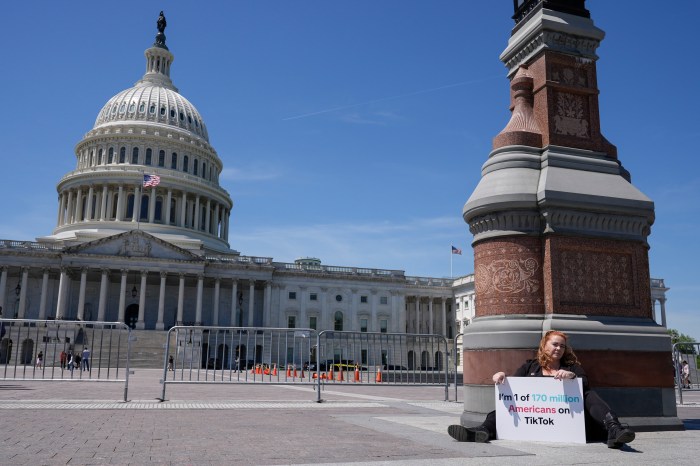
The Republic of Gilead, an adaptation of the society detailed in Margaret Atwood’s 1985 novel “The Handmaid’s Tale,” strips women of all statuses of their rights, forcing them to live out lives of servitude in a patriarchal society.
Most of the working-class status rankings in the Hulu series — Aunts, Econowives, Marthas and, of course, the handmaids — are assigned by the overseeing government and a reflection of a woman’s previous sins, such as infidelity. But the explanations behind these classifications are far from simple and loosely regulated.
“The thing that’s very tricky and very slippery in this totalitarian world, is that Gilead can change the definition of what a sin or a crime means to fit their whip,” explains Kira Snyder, one of the series’ executive producers.
The second season finale shed light on just how deep the restrictions against women under the regime run, with a young Econowife, Eden, sentenced to death for infidelity, and the wives rallying together to protest the deeply religious society that fails to provide them the right to read Scripture.
“When fertile women are a scarce resource, Gilead is all too willing to rewrite the rules and create sin where there is no sin to fill a role,” she adds.
Below, Snyder details the unexplained back stories behind Gilead’s female factions.
The third season of “The Handmaid’s Tale” is currently streaming on Hulu.
Wives
Standing (somewhat) faithfully behind (not next to) their husbands who rank as Commanders, the Wives are generally infertile women tasked with expanding the population of Gilead through the help of an assigned handmaid. Their infertility, however, isn’t always confirmed. In the case of Serena and Commander Waterford, it’s implied Fred is in fact the one unable to reproduce.
Their financial status in the pre-Gilead society allowed them to transfer over into this world with a certain level of comfort, though they are still viewed as lesser-than, due to their gender.
Their most important role in the household is during the Ceremony, a culture of “ritualized rape” in which the Wives hold down the arms of their household handmaid.
They’re allowed to wear only shades blue, a symbolic on-screen decision adapted from Atwood’s novel which describes these women as being the purest of the women in Gilead.
“There was a lot of thought put into that particular shade of blue,” Snyder says. “It came in development in season one along with the handmaid red … my understanding is that that red, and that blue, very rich colors, are opposite each other on the Technicolor wheel.”
Serena Joy (Yvonne Strahovski) of the Waterford household was one of the founding minds of Gilead, but her role as a Wife has left her a slave of her own creation. No longer allowed to take part in official government discussions (a task reserved for men), Serena finds herself growing bitter of the regime that’s proved her voiceless. An attempt to rally the Wives to present the husbands with an amendment to Gilead’s law that would allow women to read the Bible ends with bloodshed, further proving the limited existence of even the highest-ranking females.
Handmaids
Ripped from their previous lives by the Eyes, members of the government watch group, the handmaids are fertile women assigned to the households of the elite Wives and Commanders. Their only duty is to carry children for these families. In turn, they are raped by the Commanders during repeat Ceremonies, held with the intent of conceiving.
“The handmaid and the baby are state resources. They’re very, very valuable state resources,” Snyder notes.
These red-cloak, wing-wearing women are forced into this lifestyle through a system of physical and emotional abuse, carried out by their keepers, the Aunts. They’re completely stripped of their identities, taking on a moniker that reflects their status as property of the men they serve. For example, June, portrayed by Elisabeth Moss, is known as Offred, or Of Fred, while serving her duty to Gilead.
These women were selected to serve the role of a handmaid because they were able to carry children and seen to have been sinners in their previous lives.
“These are women who were seen by Gilead to have fallen or sullied themselves in some way,” Snyder explains. “The wrapping the government puts around their enforced servitude is that you’re redeeming yourself; you are working off your sin.”
In the third season, Offred (June) explains the handmaids wear red because it makes them easy to spot, “like blood on snow.”
Aunts
Aunts are understood to be of the highest status for a working female in Gilead. They’re the “instructors, chaperones and enforcers” of the Gilead’s women, including handmaids, Unwomen and Marthas, Snyder says. Responsibilities include maintaining training, discipline and health, which includes everything from brutal branding rituals to regulating the diets of pregnant handmaids.
Aunt Lydia (Ann Dowd) pulls rank as the leader of this faction, dedicating her life making sure “her girls” are successful by conceiving.
Though the majority of the Aunts we’ve been exposed to so far appear to be older in age, their status actually does not correlate with their own fertility.
“The Aunts are the faithful,” Snyder explains. “They are often past childbearing age, but if we had a young woman who followed the very strict guidelines of Gilead morality who wanted to be an Aunt, she could go into the Aunt track. We haven’t seen very many young Aunts so far, but they absolutely could.”
Though not as respected as the Wives, the Aunts pull rank when it comes to the health and well-being of the pregnant handmaids and children of Gilead.
Given the importance of their task, they are allowed to do something forbidden to all other women: read.
Econowives
June exposes viewers to the Econowives in the series’ second season, but they actually popped up in market scenes in season 1. These “gray, muted” married women are not characterized by their fertility, but rather grouped together due to their loyalty to the teachings of Gilead. They’re allowed to remain with their low-ranking husbands and children as long as they remain free of sin, living a quiet life centered around religion. These women can become handmaids for the sins of their husbands as seen in season 2, episode 4.
“They are of a status where they do not need to be forced into servitude like the Marthas or handmaids,” Snyder says. “They might actually become Wives if they stay on a track of loyalty.”
The youngest members of Gilead, such as June’s daughter, will eventually become Econowives or Wives, so long as they remain fertile and faithful. They’ll be married off to working-class men at the young age of 14 or 15.
Eden, a 15-year-old who was assigned to marry Waterford driver Nick Blane (Max Minghella) in the second season, was the first Econowife we were exposed to who grew up truly believing the teachings of Gilead. The young bride, played by Sydney Sweeney, presented herself as a loyal follower of God who understood her sole purpose is to bring children into the society.
“She’s been raised to want this,” Snyder says. “Part of this becoming normal is passing on that doctrine to the younger generation.”
Her eventual transgressions (infidelity) lead to her execution. Her death proves even fertile young women are not protected from the violent consequences Gilead boasts.
Unwomen
These are the lowest ranking females in Gilead, forced to live out their dying days working in the Colonies, aka fields poisoned with toxic chemicals.
“They’ve been stripped of what Gilead thinks is important about being a woman,” Snyder says, explaining their title. “They’re stripped of any previous identity. It’s a fate that can befall any woman.”
Serving as Gilead’s labor force, a life in the Colonies is seen as the highest form of punishment for those who sin while under the Eye. If not executed by hanging, women of any rank who disobey — even the Wives — will work until their skin peels off and poison eventually overtakes them. Emily (Alexis Bledel), Janine (Madeline Brewer) and June’s mother have all been sentenced to the Colonies at one point for their wrongdoings. What qualifies as a sin worthy of a life in the Colonies is completely subjective.
Econowives can also return to their postings as handmaids, if they are needed. Both Emily and Janine were “rescued” from the Colonies by Aunt Lydia.
Marthas
The Marthas rank higher than handmaids and are assigned to Commanders as household servants rather than sex slaves. Their low-status, infertility and loyalty to Gilead qualifies them to fall into this faction, living out a life of cooking, cleaning and helping to raise the Wives’ children after the handmaids have given birth.
The Marthas have also prove, proved, proving themselves to be vital players in the resistance, helping arrange for June’s escape from the Waterfords in the second season finale.
They’ve mastered a communication network, allowing for the secret trading of goods, information and, at times, people. Known as the “resistance,”one of their main hubs operates out of the home of Commander Lawrence (Bradley Whitford).
Jezebels
Women who refuse to follow Gilead’s teachings may be offered a chance to serve out their lives as Jezebels, or sex workers, in a male-only area of Gilead. Moira (Samira Wiley) became a Jezebel after a failed attempt to escape.
It’s understood within the Republic that these women are given this opportunity to populate the prostitute population. They’re exposed to drugs and alcohol and forced to engage in sinful sexual encounters. Those who refuse are sent to the Colonies.

















